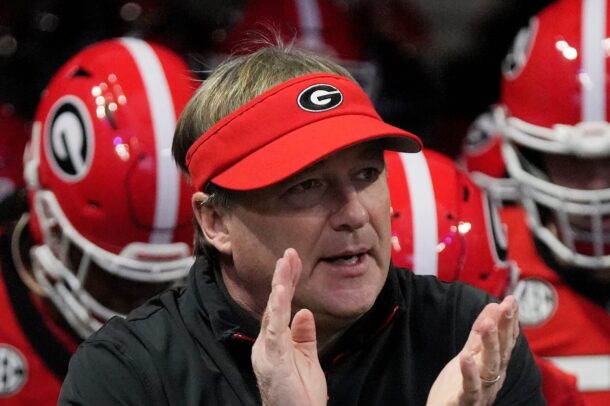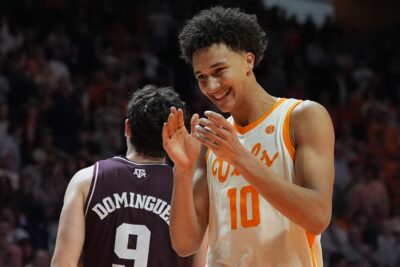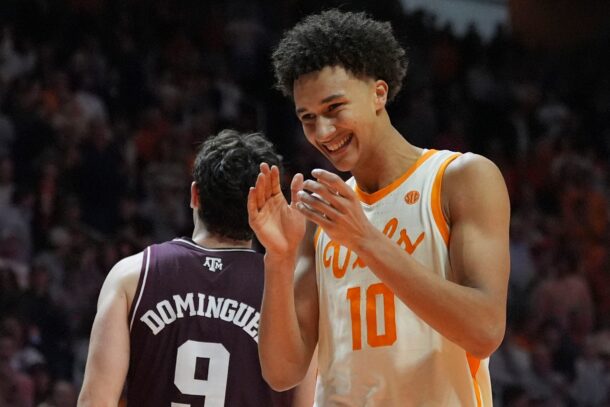
Preseason polls can be maddening, but here’s why getting rid of them would be even more maddening
If you read that headline in disgust, let me save you some time and energy. I know you’re not a fan of preseason polls. I bet if you polled every college football fan, the majority would support banning preseason polls altogether. They’d tell you that the preseason Associated Press Poll, which has existed since 1950, shouldn’t have any bearing on who gets to play for a national championship, and preseason media narratives should never serve as a gatekeeper.
I hear that. Trust me.
So when I saw Adam Rittenberg tweet about how several Big Ten coaches would like to see an end to preseason polls, I felt the need to dig into this topic with some modern context.
I understand that argument. I especially understand that argument from coaches who are, by nature, control freaks. A preseason poll can elevate expectations for an unproven group, which is a coach’s nightmare. I’d argue that coaches are paid handsomely to overcome things like that, and I’d also argue that for every coach who fears what a lofty preseason ranking will do to his team, there’s a coach who embraces what a disrespectful preseason ranking will do to his team. Whether they admit it or not, it’s a card that’s been played for decades.
No, that’s not the best argument for keeping preseason polls. There’s a better one.
Will getting rid of the preseason AP and Coaches Poll stop people from ranking teams during an 8-month offseason? No way. You can find way-too-early Top 25s and post-spring Top 25s on sites like ESPN, CBS Sports, The Athletic, On3, Saturday Down South, etc. Oddsmakers will still have preseason odds for regular-season over/unders, conference titles, Playoff berths and the national title. It’s an 8-month offseason in the internet age. Conversation matters. It doesn’t mean all preseason conversation is good preseason conversation. Some stupidly factor “strength of schedule” into a preseason ranking, which is the dumbest thing one can do on this earth. If that’s how everyone fills out preseason ballots, yes, abolish them yesterday.
(Also, abolish the Coaches Poll yesterday. There’s no way to prove that coaches actually fill those out. My “keep the preseason poll” argument is strictly referring to the AP.)
But the dirty little secret is that in the internet age, a preseason poll that comes out in mid-August feels more like an end-of-offseason aggregation ranking then a true gatekeeping of who’ll play for a national title. Disagree with that? Show me all of these annual instances in which a preseason AP Poll ranking made an impact on a late-season ranking on playing for a title or even getting into the Playoff.
I know, Auburn fans. That 2004 team got robbed. I hear ya. If it had started off at No. 2 instead of No. 17, it would’ve been able to play for a BCS National Championship. But that didn’t happen because preseason No. 2 Oklahoma and preseason No. 1 USC both went unbeaten in the regular season. At a time when being No. 3 meant not playing for a national championship, yes, that preseason ranking mattered at the worst possible time in that unique way during the BCS era.
So if a preseason ranking mattered, then being a preseason No. 1 should’ve been the ultimate shortcut to a national title, right? Well, the preseason No. 1 team from 2005-24, AKA the 20 years after that Auburn snub, fell short of winning a national title 19 out of 20 times (2017 Alabama was the lone exception). If the entire goal of abolishing preseason rankings from the AP is to eliminate overvaluing/undervaluing teams, ask yourself this.
When should teams be valued then?
Some have suggested “just rank them after the first game.” OK, so in a sport that has national title contenders playing anyone from Montana State to Ohio State, you think 1 game is suddenly the time to rank teams?
What about waiting until October, you ask? That logic suggests that it would be a battle of unranked teams for Ohio State and Texas, but a Michigan State-Nebraska game in early-October would meet that threshold. Call me crazy, but I’d be more comfortable calling the former a “battle of ranked teams” and leaning into the fact the they played in a semifinal game, as opposed to rewarding Nebraska and Michigan State for navigating a couple of Group of 5/FCS teams and 1-2 Power Conference games.
If the thinking is “all polls are meaningless until the last one” and we shouldn’t have any polls before then, wouldn’t that just make for a late-season mess that’s more rooted in preseason brands bias than actually having in-season rankings? That’d be inevitable.
The logic behind the preseason poll pushback is that it factors too heavily into the overvaluing and undervaluing of teams. Why then, does it feel more like the AP voters change their rankings to align with the first Playoff poll as opposed to the other way around? The selection committee’s first rankings aren’t just a “copy and paste” from the most recent AP Poll. Don’t believe that?
In each of the 11 years of the Playoff, there’s been at least 1 discrepancy between the top 4 in the first Playoff Poll and the most recent AP Poll. In other words, if you went into those first Playoff Poll shows expecting the selection committee would just copy and paste the top 4 of the AP Poll and call it a day, you’ve been wrong every single time.
Last I checked, the selection committee was the group who held all the power. If the AP voters aren’t shaping how the selection committee ranks teams, what’s the big discrepancy?
Ah, now is where you tell me 2017 UCF was jobbed by AP voters because it was unranked in the preseason
I’ll say this. In the 4-team Playoff era, it was virtually impossible for an undefeated Group of 5 team to put together a strong enough résumé to make the field. The only way to circumvent that was to rack up multiple quality Power Conference victories AND enter the season with a preseason top-10 ranking. That 2017 UCF team had neither of those things, while that 2021 Cincinnati team had both of those things.
It took longer for 2017 UCF to earn a top-15 ranking in the AP Poll. Why? It was 6-7 in 2016 and 0-12 the year before that, and it didn’t earn a Power Conference win in either of those seasons. Compare that to 2021 Cincinnati, whose lone blemish the previous season was a loss to Georgia on a go-ahead field goal in the final 2 seconds in the Peach Bowl. It earned a preseason top-10 ranking in 2021, and it built on that by beating Indiana (a preseason top-25 team who was then unranked at the time of the matchup) and No. 9 in Notre Dame in South Bend.
The preseason poll is a convenient thing for UCF to blame, but ultimately, it was hurt by having that Georgia Tech game canceled because of a hurricane, as well as the fact that the only other Power Conference team that it beat was 4-8 Maryland. And hey, if this were 2025, UCF would’ve actually have a shot to play for a national title because it would’ve been the highest-ranked Group of 5 conference champ (I realize that UCF is now in the Big 12).
But sure, let’s all blame preseason polls for a borderline problem with the previous system that doesn’t even exist anymore.
Also, if the preseason AP Poll was impacting the selection committee too much, why then did the selection committee have UCF ranked 1-3 spots lower than the AP every time? Shouldn’t a poll that doesn’t start ranking until Week 9 be numb to preseason narratives as opposed to an AP Poll that begins in August?
It doesn’t work like that. At least not to the extent that many would assume.
So what’s the solution? Treat preseason polls for what they are and nothing more
That is, entertainment. They drive discussion, they perhaps drive (some) ticket sales and they set expectations in a sport that’s going to have some sort of expectations whether preseason polls exist or not. Are they perfect? Of course not. Outside of a beautifully-executed wheel route for 6, there might not be anything in this sport that’s truly perfect.
But a preseason poll like the AP can be taken at face value now more than ever because of a Playoff field that just tripled. If coaches are frustrated that it cranks up pressure to unrealistic levels, they’re probably in the wrong field. If coaches are frustrated that it ignores how good their team is about to be, they probably should’ve been better the previous year. And if they can’t spin that into some sort of preseason bulletin board material, they’re probably also in the wrong field.
Despite what off-the-record coaches will tell you, preseason polls do serve a purpose in this unique sport.
Coaches might not like the optics of being a preseason top-10 team who then fails to finish as a top-10 team, and fans might get frustrated that a traditional power is getting more of the benefit of the doubt in a Week 3 ranking. Ultimately, though, the results tell the tale.
If you take a preseason poll as gospel, you’re looking at it all wrong. If you take a preseason poll as a meaningless exercise that should be abolished, you’re also looking at it all wrong.
My advice? Find that middle ground and argue about real issues in the sport.
Connor O'Gara is the senior national columnist for Saturday Down South. He's a member of the Football Writers Association of America. After spending his entire life living in B1G country, he moved to the South in 2015.






